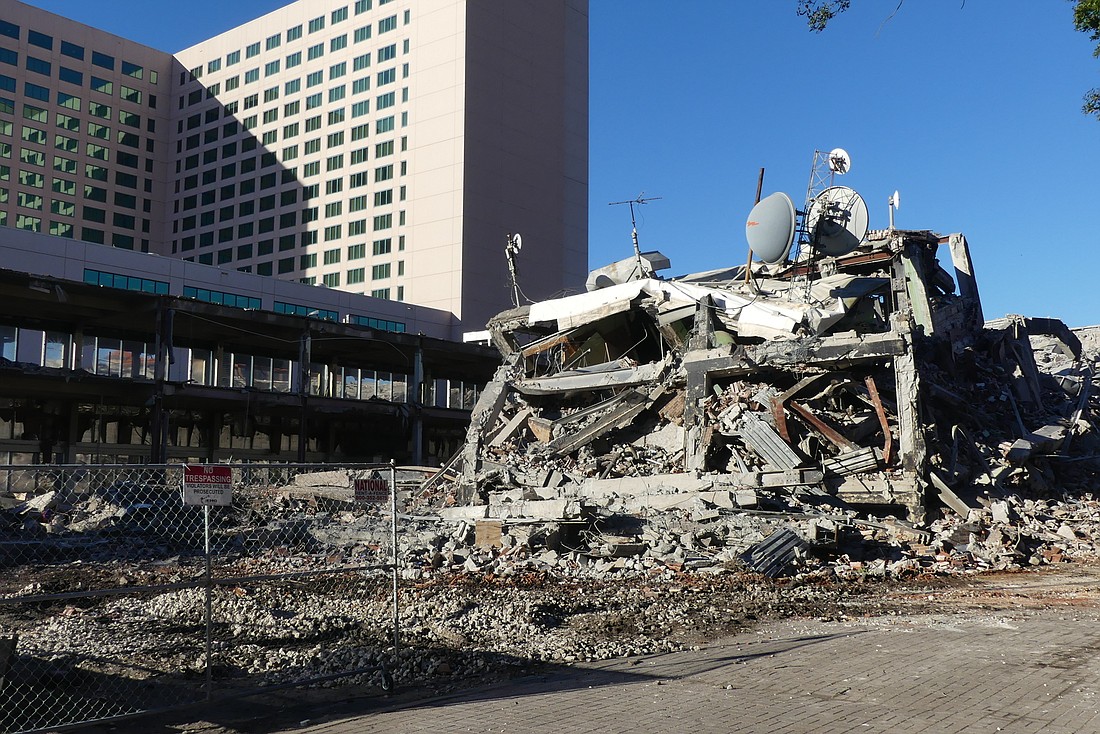
As Jacksonville’s former City Hall crashed down Sunday morning, those who worked in the building over the decades found themselves at peace.
City Council Vice President Scott Wilson is one of Jacksonville’s longest-tenured public servants, having come up through the ranks of the consolidated government for three decades.
“I’ve got a lot of good memories from my time over there,” Wilson said a few minutes before the controlled detonation.
He joined about 300 other city and business leaders Sunday morning to witness the implosion at The River Club on the top two floors of the 35-story Wells Fargo Center in an event organized by Perry-McCall Construction Inc.
About 8 a.m., Environmental Holdings Group and Controlled Demolition Inc. detonated dynamite charges placed throughout the old 15-story City Hall building at 220 E. Bay St.
About 10 seconds later, a cloud of dust and a pile of rubble remained.
Wilson said old the City Hall, which opened in 1960, had charm in its heyday.
“I always thought the balcony outside the City Council chambers on the 15th floor was one of the great parts of that building,” Wilson said. “It had these old, really strong wooden doors and a lot of design elements from that era.”
Wilson’s first city job was in the public parking division in 1988. “My office was in room 104,” he said.
By February 1994, he moved to the former Duval County Courthouse, which is being demolished conventionally.
Like other city officials gathered for the implosion, Wilson said tearing down the structure was the right decision.
“It was an old building with space that wasn’t really conducive to the way we do business today,” he said. “I was always concerned about the asbestos, too.”
As crews began interior demolition in August, they performed asbestos abatement and removed hazardous materials to prepare for the implosion.
Other city leaders, like council member Tommy Hazouri, had a larger role in the building.
Hazouri was one of seven Jacksonville mayors to serve there since it opened in 1960. His term was 1987-91.
“A lot of history, a lot of fun and a lot of policymaking,” Hazouri said when asked what he best remembers about the structure. “I always looked at it like a little UN (United Nations) building.”
One of Hazouri’s biggest achievements was ridding Jacksonville of tolls on roads. He said his office had signage facing the river that counted down the days before toll booths were removed.
He said some of his fondest memories were the times spent alone in his 14th-floor office reflecting on the job and overlooking the St. Johns River.
“That mayor’s office gets pretty lonely sometimes, and it was always nice to be able to sit back and think about the job you’re doing,” he said.
“The good news about being on the water was you could look out and reflect on the pressures of it all and remember why you got into public service,” Hazouri said.
Paving the way for development
Like Wilson, Hazouri said the implosion was a step toward spurring economic development along the banks of the St. Johns River.
The city developed City Hall and the old courthouse on the riverfront to encourage activity in an area of Downtown that was overwhelmingly industrial at the time.
“Now times are changing and we don’t necessarily want government buildings sitting on prime riverfront property,” said Hazouri.
When demolition is completed in May, the combined 8.4 acres are expected to be marketed for private development.
The mayor’s office said it has no plans yet.
The city relocated operations to the St. James Building at 117 W. Duval St. in 1997. The State Attorney’s Office used the old building for a few years after that. Court activities moved from 330 E. Bay St. to the new Duval County Courthouse at 501 W. Adams St. in 2012.
Since then, the city has tried unsuccessfully to market the property for redevelopment without demolishing the old structures.
“It really wasn’t built to be anything other than a municipal building,” said council President Aaron Bowman, who also was at the Wells Fargo Center on Sunday. “So, converting it into something else would’ve been very hard to accomplish.”
Through his 2017-18 Capital Improvement Program budget, Mayor Lenny Curry allocated $8 million to demolish both buildings.
“Developing is all about minimizing risk and we took a lot of that risk away by taking them down ourselves, making sure the property is environmentally sound before we put it out for bid,” Bowman said.
The city previously identified the properties as a site for a new convention center.
After months of debate, the Downtown Investment Authority decided to table discussions, saying Jacksonville wasn’t ready to build a new facility.
Bowman said that was the right move.
“We have an opportunity now to really think about what is successful development there,” he said.
No plans are being discussed publicly, other than laying sod after the buildings are removed.
Bowman said he wants to require any development group to retain some public green space so residents and visitors can enjoy the riverfront.
“Because our river is our greatest asset,” he said.